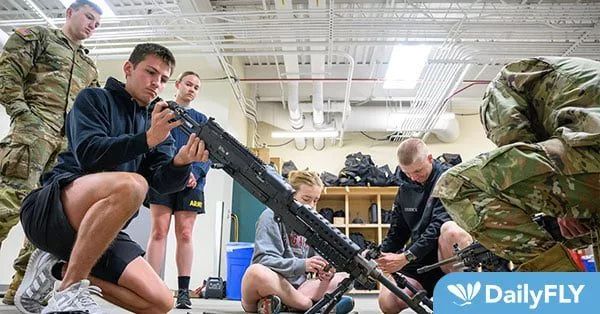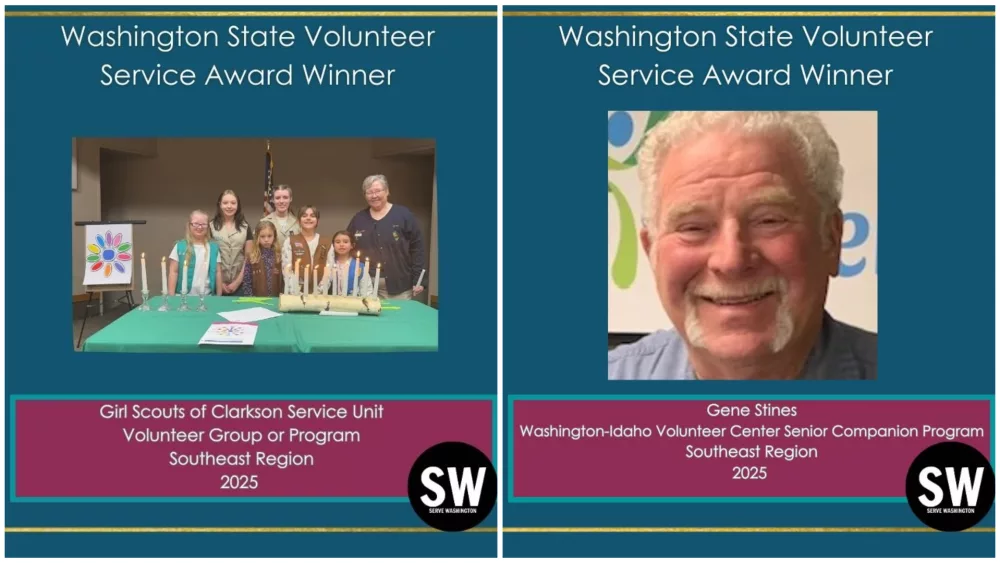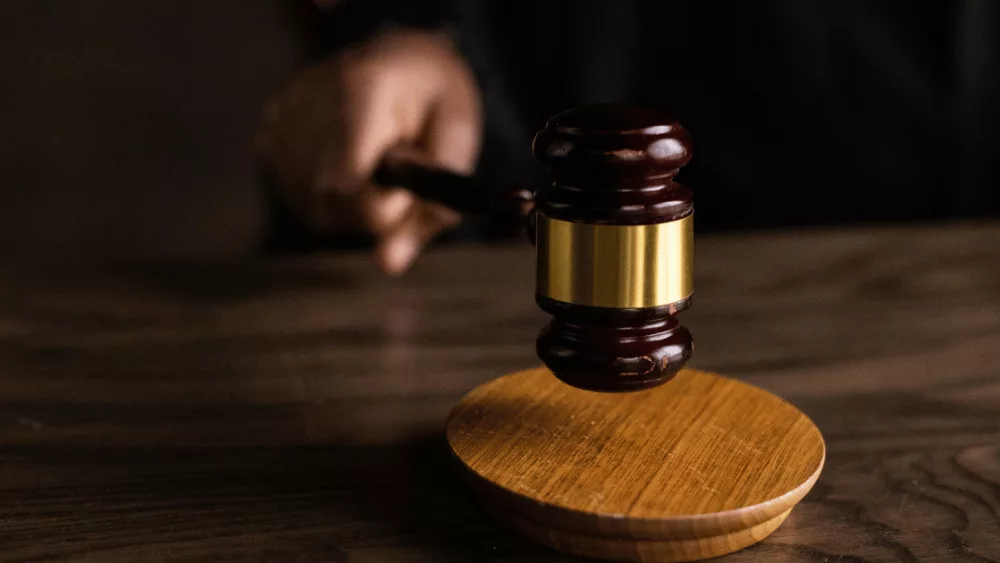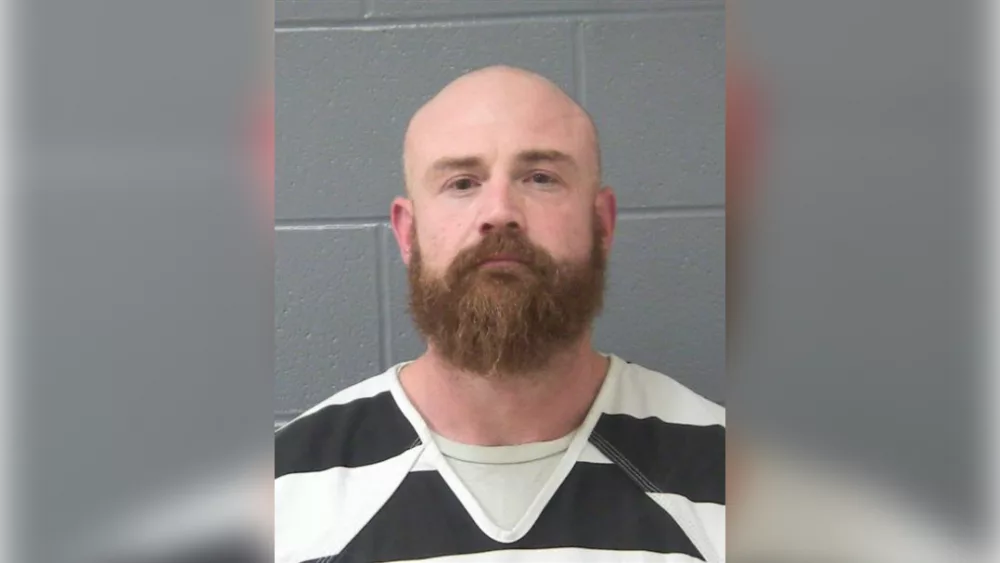PULLMAN – More than an hour before the sun heralds a new fall day on the Pullman campus, a group of U.S. Army ROTC cadets assemble outside of the WSU police station ready to be tested.
Inside, they’re greeted by the team’s coach, Sergeant First Class Patrick Valkovic, a senior military instructor at WSU, as well as an accompaniment of M-249 SAW machine guns. Their assignment is to learn the ins and outs of the M-249, which is capable of firing 850 rounds per minute at a speed of 3,000 meters per second.
The cadets fan out, assembling and disassembling the weapons with a rough goal of completing their task in three minutes. The cacophony of metal striking metal quickly envelops the space, as cadets work to set personal bests or assist their teammates with the more dexterously demanding portions of the project.
Leading the early morning task is the captain of WSU’s Ranger Challenge team, Evan Smith, a construction engineering senior.
Last year, WSU’s Ranger Challenge Team finished second among the 10 schools that comprise the U.S. Army ROTC’s 8th brigade, Task Force East. The group extends as far north as Alaska and as far south as California, with schools in Washington, Idaho, Montana and Nevada included.
The WSU team fell just short of advancing into the nationwide stage of the competition. And while they are looking to change that this year, Smith’s goal is to help his fellow cadets with their military-oriented goals and to set ablaze in them a passion for the program.
“I love the group that we’ve put together,” Smith said, adding that the biggest lesson he learned as a member of the team last year was that comradery is as important a metric as anything else in building the team. He continued, “I would rather have this group than a group of nine Olympic athletes that don’t want to be here, don’t get along and don’t want to work hard.”

The Ranger Challenge functions as the varsity sport for the U.S. Army’s Reserve Officers’ Training Corps programs nationwide. It features an array of events that test physical and mental abilities, ranging from physical fitness trials to weapon accuracy measurements and land navigation challenges.
WSU Army ROTC has the added incentive this year of being the home team, welcoming their counterparts from nearly a dozen schools across the region Nov. 4-6. Partway through the regional competition, the teams will undertake a 14-mile march with 35 pound rucksacks on their backs, journeying from Martin Stadium to the University of Idaho campus, where they’ll be picked up and transported to Camp Grizzly for the final stretch of the competition.
The Ranger Challenge team
Each Ranger Challenge team is composed of nine cadets and two alternates. At WSU, members range from sophomores to seniors. Some, like third-year criminal justice and history double major Andrew Dixon, came to WSU as an ROTC cadet in part to help pay for this education.
“In high school I was looking for ways to pay for college, and I was fortunate enough to get 3 year scholarships, which my parents were very excited about,” Dixon said.
Others, like Smith, joined after arriving at WSU because they found in the program a place to further their ambitions and career goals.
“I had a picture in my head of a 100-person group of absolute badasses that comes out every morning, so I wanted to train up and make sure I was competent enough to show up,” Smith said.
Many on the team saw in the Ranger Challenge an opportunity to test themselves beyond what was required as part of the ROTC program. It also afforded them the chance to be part of a team similar to those they participated in during high school. The team includes former varsity baseball, track and cross country standouts.
Each weekday, the team assembles as early as 5 a.m. to practice the skills that’ll be tested as part of Ranger Challenge. Some days its weightlifting or swimming at the Student Recreation Center, others its tactical challenges like nighttime exfiltration and recon at the WSU Arboretum.
The U.S. Army ROTC program at WSU, known as the Cougar Battalion, has been a part of the Pullman campus for more than 100 years. Thanks to support from the Office of the Provost, Cougar Battalion was able to conduct its courses and training exercises throughout the pandemic, at times remotely or with the aid of personal protective equipment.
Recruitment challenges brought on by the pandemic pushed the number of enrolled cadets below average, though its current cadre of 115 is getting nearer to pre-pandemic levels, said Lieutenant Colonel Matt Sheftic, who leads the battalion and serves as a professor of military science at WSU.
“The last year has been relatively normal, albeit with masks on occasion, but we’ve seen our cadets go out and get vaccinated and that’s allowed us to return to a sense of normalcy,” Sheftic said.
First time’s the charm
After their early morning spent with machine guns, WSU’s Ranger Challenge team joins up with the rest of the Cougar Battalion for training with the U.S. Army’s standard-issue M4 carbine at the Whitman County Firing Range. Cadets are quizzed on the basics of gun range safety before being tasked with firing a series of grouped pattern shots from their rifles.
It’s the first time Makena Spohr, a biochemistry sophomore, has fired a gun, much less an M4. Spohr , one of two female members on the team,manages to qualify her first time on the range, putting shots in an impressively packed cluster on the paper target.
Spohr saw ROTC as a great way to pursue her goal of becoming a medical doctor. She plans on taking an educational delay from her required military service to get into medical school and join the Army Medical Corps.
Initially, she didn’t realize she was being recruited to join the Ranger Challenge team.
“Cadet Thomas invited me to work out with team, and by the time I realized it was a tryout-and-cut team, I was not about to go back,” Spohr said. “I kept going, kept pushing, and Thomas always had my back.”
She excelled and even joined the long marches clad in extra weight, having spent a good portion of her childhood hiking near her home in Northern Nevada. The tactical tests have been demanding for the new WSU student, but all along the way her teammates have been there to lend their expertise.
“I heard a lot of people say that with the group trying out, it didn’t matter who made the team, this was going to be a good team, which was reassuring,” Spohr said. “I’m super excited, and I think we’re going to do great.”





